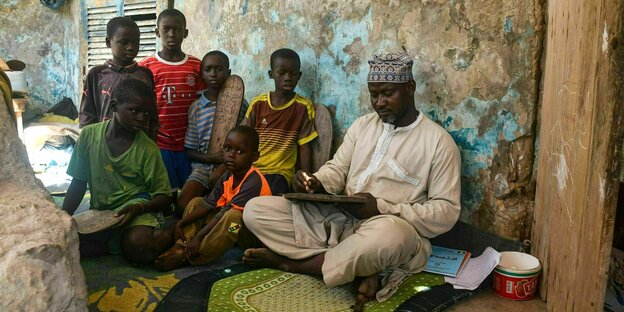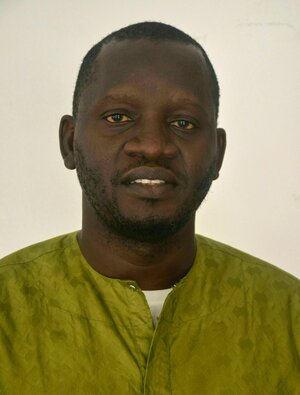In Senegal, Koranic schools have come under fire. Teachers force students to beg and abuse occurs. Parents still send their children there.

Abas M'Ballo is the founder of the Koranic school “Darou Salam” and his students also live with him Photo: Katrin Gänsler
STREET. LUIS taz | A backyard in St. Louis, in the far northwest of Senegal. While the cobblestone streets of the center are lined with popular restaurants, pretty hotels and well-tended gardens, the roads in the Medina district are sandy, the buildings are squat and not all are connected to a water supply.
Six children of preschool and primary school age sit with Abas M'Ballo on woven plastic mats in front of the entrance to his house. The elders hold wooden boards in their hands and watch as M'Ballo writes a surah from the Koran. That's what the Taliban are here for, the students of the Koran. Their parents' goal is for them to memorize the entire holy book of Islam in a few years. M'Ballo is an Islamic scholar (in Senegal they are called marabou) and founder of the Koranic school “Daara Darou Salam” (“House of Peace”). The 44-year-old man's students live with him and sometimes do not see his parents for several years.
No one knows exactly how many Taliban there are in the country. In 2018, the non-governmental organization Global Solidarity Initiative estimated that 200,000 people lived in the capital, Dakar alone. At least one in four people is forced to beg. But this is seen everywhere in the country: children, most of whom are between 6 and 16 years old, walk through the streets with plastic or tin bowls and ask for something to eat or money. They either shoo away passers-by like annoying flies or put a few coins in their bowls.
It is mainly non-governmental organizations that express strong criticism: the marabouts use forced begging to abuse their students and enrich themselves from them. At least the equivalent of 80 euro cents per day is required. Some marabou send up to 50 babies out onto the street every day. Whoever does not bring enough money home will be punished. The focus is also on poor accommodation. There are said to be not enough sleeping places, washing facilities or medical care. Photographs of chained children have been published several times.
They stay and beg
In June 2016, the government of current President Macky Sall launched a new attempt to get the Taliban off the streets. But they stay and beg. Allegations of abuse are rarely prosecuted and there are certainly no lawsuits.
The talibé system is old. In Dakar, political scientist Ibrahima Thiam, of the leftist Rosa Luxemburg Foundation, says: “Sometimes a child studied the Koran with someone and also lived with that person. Since there was not enough money, they went to eat elsewhere.” The crucial difference from today is: “Several households provided food for a child. My father was also talibé, although his father was rich. That was a form of training: ordering food somewhere else kills your ego.”
In Senegal, more than 97 percent of the 18 million inhabitants profess Islam, shaped by Sufi brotherhoods. The greatest are the Murids, the Tijans and the Khadiriya. Its social influence and the close ties of its members are one of the reasons why terrorist groups in neighboring Mali, as well as Wahhabi movements, have so far had little success. There is a great desire for children to receive a religious education.
Above all, many would like the training to take place in St. Louis. For example, although Touba is considered the holy city of the Murids, all the founders of the important brotherhoods lived in St. Louis for some time. It is often said that nowhere else in the country can you study the Quran as well as in this UNESCO World Heritage city, which has more than 500 daaras. Mosques shape the urban landscape.
The path of life: laid out
That was also the reason for marabou Abas M'Ballo to move to St. Louis. He spent his childhood in Casamance, on the southern border with Guinea-Bissau. His goal was always, “I want to build at least one Daara in St. Louis.”
He brought his students with him. His families live in the cities of Kolda and Ziguinchor, hundreds of kilometers away. In fact, they should send money regularly to cover tuition and accommodation. “But it's not like that. “I pay for everything, from electricity to medicine if someone is sick.” He doesn't say where he gets the money from.
M'Ballo's life path was always predetermined. Since his childhood he has only studied the Quran and has learned nothing else. He also does not speak the official language, French. “If I had learned a trade, the children would probably be with me in my workshop today.”

Ibrahima Thiam: “It once happened that a boy studied the Quran with someone and also lived with that person.” Photo: Katrin Gänsler
This is the commitment of the “Maison de la Gare”. Founded in 2007, the center offers Talibé accommodation for a few nights. They can wash themselves and their clothes, treat scabies wounds, and participate in French classes. For students of the Quran, this is a break from stressful everyday life. Vocational training positions are also offered here. The center is directed by Momar Mbaye. “We are fighting to ensure that children are no longer sent to the streets to beg,” he says, “but also to ensure that there are finally structures in Koranic schools.” and about the Koran, nor about how they will be housed and cared for.
In Senegal, as in other West African countries, the Franco-Arab school system is becoming increasingly consolidated. These are often private schools that emerged from Koranic schools and in which French and mathematics subjects were added. So that children and young people have the possibility of getting a job. In Senegal alone, around 300,000 young people enter the labor market each year. The fight for few jobs is great.
Now there is a pause in the “Daara Darou Salam”. M'Ballo's wife bought fish at the market and is preparing lunch for everyone. M'Ballo follows the tradition of memorizing the Quran. He is the basis of life. Abas M'Ballo is not opposed to the idea of complementing this with artisanal training. “Otherwise, the children will only be able to become what I am: marabou.”